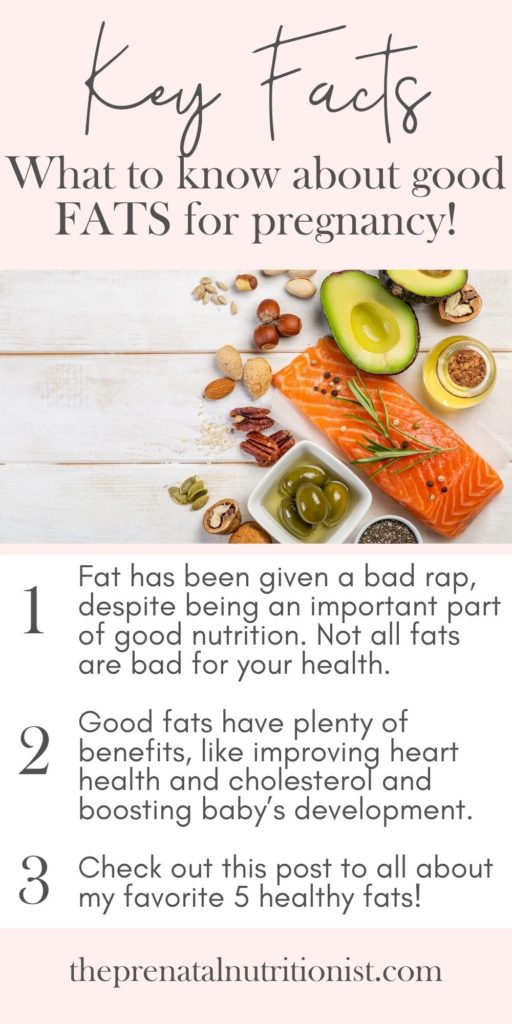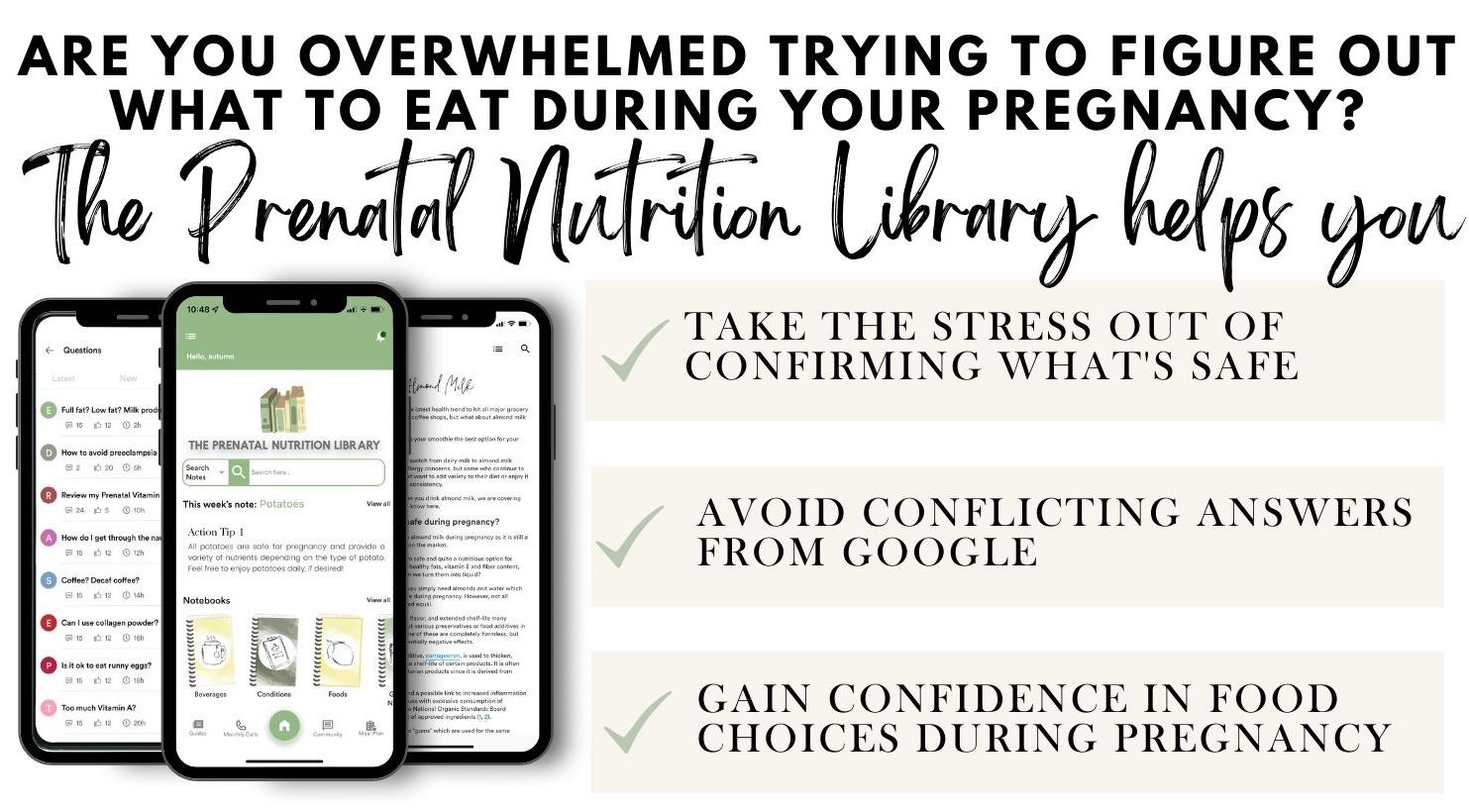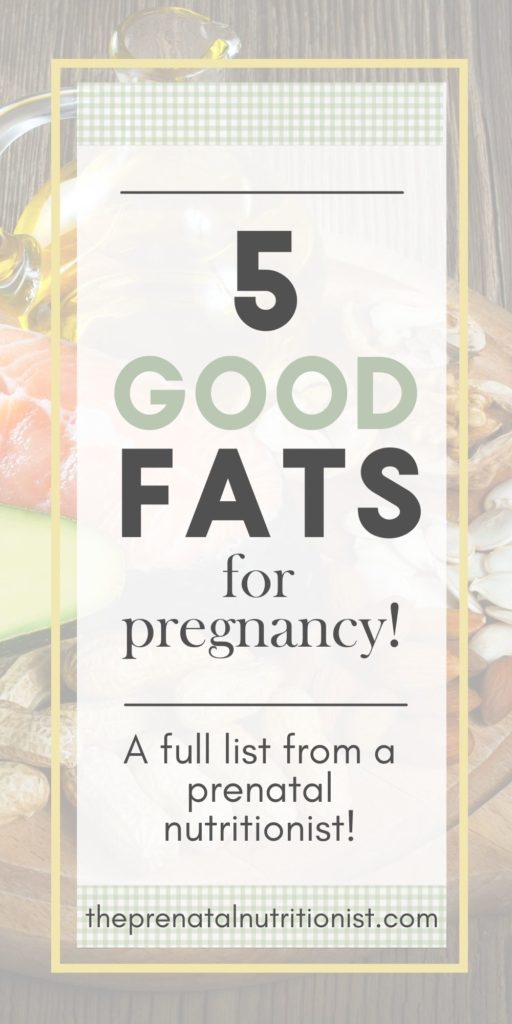
Nutrition is important for everyone, however, good nutrition is especially important during pregnancy since you are now providing nourishment for two (one of which is growing and changing every day!). Eating a variety of nutrient-rich foods with an abundance of vitamins and minerals can help keep pregnant women and their growing babies healthy throughout pregnancy.
There is a misconception that fats equal increased calorie intake and therefore, increased weight gain but this is not the case. Quality fats are a healthy food choice throughout pregnancy. Fat has been given a bad rap, despite being an incredible important part of good nutrition for pregnancy. It is true that not all fats are created equal, though. Good fats have plenty of benefits, like supporting heart health, nervous system, and baby’s brain and overall development.
Here’s a roundup of five nutritious fats that pregnant people should include in their diet.
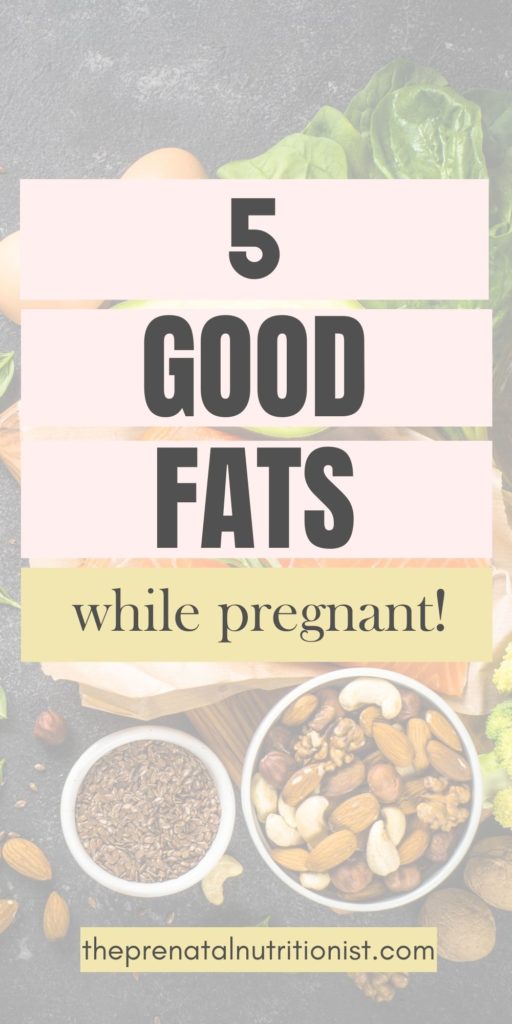
5 Good Fats For Pregnancy
Avocados
Avocados make the cut on almost every “superfood” list out there. They are a great source of monounsaturated fats. Avocados also contain folate, fiber, potassium, vitamin B6, vitamin C, and magnesium.
The other great part about avocados is that they pair well with many dishes. In addition to eating them on their own with a spoon, you can add avocado to smoothies, on top of your favorite salad, as the base of a sauce or dressing, in salsa, and much more.
Read more about the benefits of avocado during pregnancy HERE.
Nuts And Seeds
Nuts and seeds are excellent sources of healthy fats and antioxidants, zinc, protein, and folate.
Zinc is essential for both mom and baby. Zinc plays many roles. One crucial part is that zinc is needed for a baby’s brain development. It is also essential for supporting both mother’s and baby’s immune systems. Protein plays a vital role in just about every process in your body. It provides the building blocks for your baby’s development. Folate is crucial in the prevention of neural tube defects.
Nuts, seeds, and nut and seed butter, like almond butter or peanut butter, contain monounsaturated and polyunsaturated fats. Monounsaturated fats, or MUFAs, are touted for supporting heart health. As well as improved sleep quality during pregnancy. They also help support your baby’s overall growth and development.
Polyunsaturated fats, or PUFAs, include omega 3s, omega 6s, and omega 9s. Highly processed sources of PUFAs should be limited as much as possible. Whole food sources of PUFAs, particularly omega 3s, are a great option to enjoy during pregnancy. Whole foods with omega-6s include walnuts, peanuts, sunflower seeds, and flax seeds. Omega-3-rich foods include fatty fish, seaweed, enriched eggs, and grass-fed meat.
Full Fat Dairy Products
Another source of good fats to consider adding to your pregnancy diet is full-fat dairy products like yogurt, milk, cheese, and cream.
Consuming moderate amounts of milk during pregnancy has been associated with healthy fetal growth and infant birth weight. Another study found an association between eating high-calcium yogurt and a lower prevalence of depressive symptoms in pregnant women. Even research suggests that consuming a good amount of dairy products during pregnancy can reduce the occurrence of eczema and asthma in infants.
Full-fat dairy products may also support fertility for those currently trying to conceive. Consuming dairy products is also linked to better fertility in men, too! So if you and your partner are trying for a baby, incorporating full-fat dairy products in your diet is certainly something to consider.
Fatty Fish
Fatty fish like salmon, sardines, and anchovies are fantastic sources of good fats–mainly omega 3s.
Omega 3s, particularly EPA and DHA, are especially beneficial during pre-pregnancy and pregnancy, as they are among the best healthy fats for baby brain development. Additionally, DHA and EPA have significant anti-inflammatory properties, and DHA may potentially help maintain blood sugar in women with gestational diabetes.
These essential fatty acids may also help reduce the risk of developing postpartum depression and support expectant mothers’ mental health. There’s still some debate over exactly how much DHA should be included in the pregnancy diet, but pregnant people should aim for at least 300 mg of DHA daily. It’s an essential nutrient that is often lacking in prenatal vitamin choices.
Other Fatty Meats
Yes, even meat can be a good source of fat for pregnant women! Fattier cuts of meat or poultry, like bacon, beef, pork, chicken skin, and duck contain many beneficial nutrients for pregnant women, including glycine, protein, iron, and vitamin B12.
In the Prenatal Nutrition Library, I go into the debate on meat and saturated fat in greater detail, also, in my notes on fats and nutrition for high cholesterol during pregnancy. However, it’s essential to know that the claims that meat isn’t “good for you” are not evidence-based. Even the saturated fat in these foods isn’t “harmful” as many would have you believe. There is a lot of research to support the benefits of consuming meats during pregnancy and debunking the myths about saturated fats.
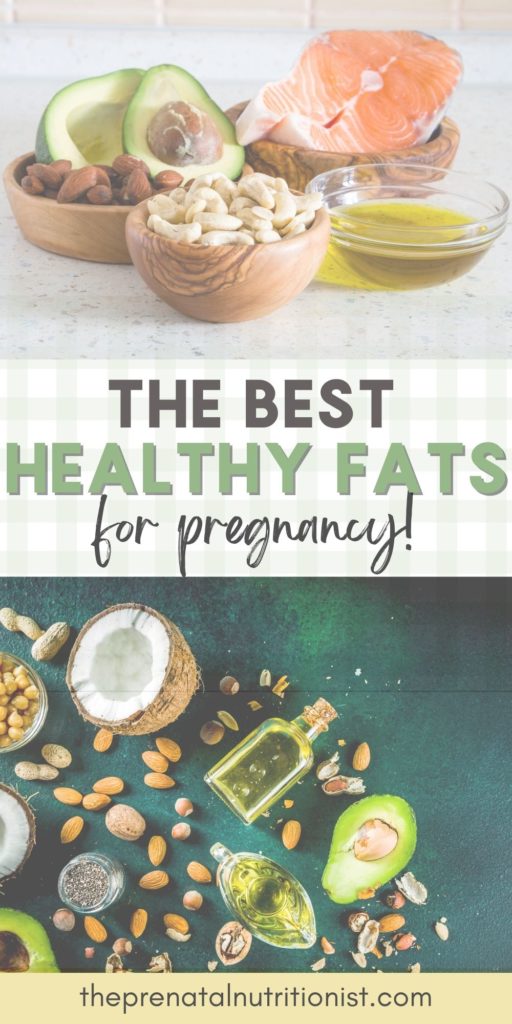
Including good fats in your pregnancy diet is one way to support your baby’s health and development.
Adding whole foods, like those that contain good fats, to your pregnancy diet is an easy way to ensure your baby is getting the nutrients it needs. These types of food choices also keep you feeling full and energized. As shown above, there are several ways to include good fats in your diet that can help get you the calories per day needed. Which one do you think will work best for you? How do you include good fats in your pregnancy diet??
Sign up for the Prenatal Nutrition Library to learn more about supporting your pregnancy with good nutrition. Inside the library, you’ll find all the evidence-based information you need on providing nourishment for two before and during pregnancy.
TPNL also offers expertly crafted 60-day trimester-specific meal plans for preconception and pregnancy. Click here to join!
